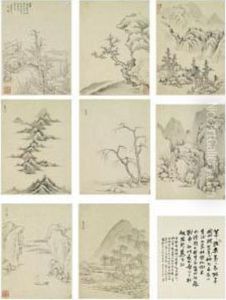Fang Yizhi Paintings
Fang Yizhi was a Chinese scholar, philosopher, and scientist during the late Ming and early Qing dynasties. Although he is not primarily known as an artist but as an intellectual figure, his work and contributions had a lasting impact on Chinese culture and thought. Fang was born into a scholarly family in Anhui province and was a child prodigy, excelling in classical studies from a young age.
Fang Yizhi's intellectual pursuits were broad, encompassing philosophy, mathematics, and natural sciences. He was particularly interested in the 'I Ching' or 'Book of Changes,' a classic Chinese text that has been used for divination. His philosophical work is characterized by an integration of Confucianism, Buddhism, and Daoism, and he is known for his ideas on the relationship between the material and spiritual worlds.
One of Fang Yizhi's significant contributions to science was in the field of optics. He is credited with having written about the concepts of focal points in lenses and the magnification of images through concave and convex lenses, predating similar European discoveries. In addition, he was interested in anatomy and had a particular fascination with the human sensory organs.
During the political turmoil of the transition from the Ming to the Qing dynasty, Fang Yizhi was caught in the crossfire of the changing times. He initially resisted the Qing conquest but later reconciled with the new regime. His later years were marked by a withdrawal from public life, focusing on his studies and writings.
Fang Yizhi's legacy is that of a polymath who contributed to the intellectual and scientific developments of his time. His works were widely read by later generations, influencing scholars and thinkers in various fields. Although not an artist in the traditional sense, his interdisciplinary approach and his curiosity about the natural world reflect a spirit that resonates with the creativity and inquiry found in the arts.
